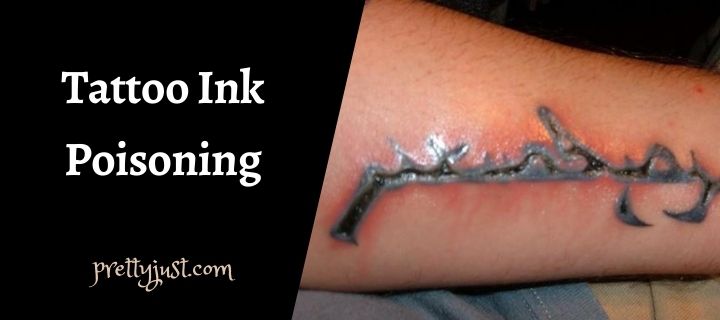Tattoos is fast becoming a common sight in our society. It is now an acceptable norm to rock a tattoo to work, school, and even church. Whether tattooing is a sin or not is a debate for another day. As much as getting a tattoo helps you express memories, your passion, and what you love, there are several health risks you predispose yourself to when getting a tat. You can get infections from the process or even tattoo poisoning.
Tattoo ink poisoning is a debate that has been going on for some time now. Tattoo artists argue that one can’t be poisoned by the ink used. They say that the ink does not enter the bloodstream. Researchers have argued that it is indeed possible for one to get tattoo poisoning. But how exactly can one get tattoo ink poisoning, and what causes it?
Causes of Tattoo Ink Poisoning

The ink components cause tattoo ink poisoning. Most of the ink used by tattoo artists has harmful substances such as lead, manganese, cobalt, chromium, and nickel. These toxic elements can find their way to the lymph nodes leading to ink poisoning. These contaminants can cause diseases, cell damage, and even cause cancer in the long run.
You might be allergic to certain ink pigments and colors, leading to inflammation and allergic reactions. This is part of tattoo ink poisoning, and your tattoo artist must test this in advance. The tattoo artist can use a swab test under the armpits with the ink they plan to use. The results usually come out within a few minutes.
Mayo Clinic has researched and identified the following colors as likely to cause allergic reactions;
- Yellow
- Blue
- Green
- Red
Now that you know the causes of ink poisoning, how can you tell if you have been affected?
Symptoms of Tattoo Ink Poisoning
Different people experience varying levels of ink poisoning symptoms. The following are the common mild symptoms you are likely to encounter;
- Pain in joints, general body, and the affected area.
- You can get swelling and reddening of the area and lymph nodes.
- You can experience irritation and the formation of rashes on the skin.
The rare and more severe symptoms of the poisoning are;
- High Fever accompanied by chills.
- Feelings of nausea and vomiting.
- Headaches brought by the tattoo.
- A slow healing process.
The symptoms of ink poisoning are similar to tattoo infection, so don’t be quick to jump to conclusions. Consult your doctor if you suspect you might be poisoned. If that is the case, talk to your tattoo artist to get information on the ink pigments he used, brand name, batch number, and manufacturer’s contact details to know the cause of the poisoning. This information will help the tattoo artist to understand the products to avoid or change. Doctors will also learn how well to deal with your case with these details as they will now know what caused the poisoning.
In case you experience an allergic reaction, then over-the-counter antihistamines should be enough.
Prevention: Tattoo Ink Poisoning
Tattoo ink poisoning takes time before symptoms are noticeable. This is because the heavy metals that cause poisoning are broken slowly into substances that affect your body. As the tattoo heals, the immune system and sun break down the metals into particles that find their way to the lymph nodes.
To reduce the chances of ink poisoning, you can do the following.
- You can have your tattoo artist take a swab test to look for any allergic reactions to any ink.
- Let your tattooist know of any allergies you might have to any products.
- Look for information on any toxic substances used to make the ink.
- If you fear the heavy metals in ink causing problems, then the only solution is not getting a tattoo.
Frequently Asked Questions
Can tattoo ink cause health problems?
Getting a tattoo exposes you to infection and other health problems. If unsterilized needles are used, or the tattooing process is done in a dirty environment, it could lead to ailments. The ink used in tattooing also contains heavy metals that can cause cancer and other health complications. One can also get allergic reactions from certain tattoo dyes. Itching and rashes are common when one gets an infection or allergic reaction.
How do you get rid of an allergic reaction to tattoo ink?
Allergic reactions are irritating and cause itching and rashes. Taking antihistamine drugs helps reduce the effects until the tattoo heals and the ink has fully settled in the skin. You can also apply a tropical ointment to reduce the effects of an allergy. It soothes the inflammation. You can also seek medical attention to prescribe a more potent medicine to minimize the impact of allergies.
Do Tattoos affect the immune system?
The tattooing process involves inserting ink into the skin using a needle. The incision in the skin is a wound that gets the body to react. It then sends a lot of antibodies to the area to fight any microorganisms entering. The body also sends adaptive responses to the tattoo skinned. These responses contain specific proteins that fight any substance they recognize as a foreign object. This still applies even to those who get repetitive tattoos. The immune response helps you in case of an attack or skin infection.
Is tattoo ink carcinogenic?
Tattoo ink is composed of many compounds, including some heavy and toxic metals. These metals, such as lead, mercury, and manganese over time, find their way to the lymph nodes and our bodies. They then create oxidative stress causing inflammation. This inflammation damages the cells, eventually causing cancer.
Can tattoo ink get in your bloodstream?
It is difficult for tattoo ink to get into the bloodstream, but not impossible. Research suggests that the ink particles are too large to be broken down to make into the bloodstream. If they do manage to get into the body, they get lodged in the lymph nodes. However, some researchers have proved that particular tattoo ink particles find their way into the bloodstream and eventually the liver.
Also read: How to Sleep With a New Tattoo: How Not To Screw It Up
Conclusion
It is almost impossible to get tattoo ink poisoning as very few cases of ink poisoning have been reported. It is easier to get infections and allergies than poisoning. However, if the components of ink do find their way into the blood, you are in for a lot of trouble as most of those components are toxic. The only way to avoid this is not getting a tattoo. You are free to take the risk, though, because of how difficult it is to get ink poisoning.


